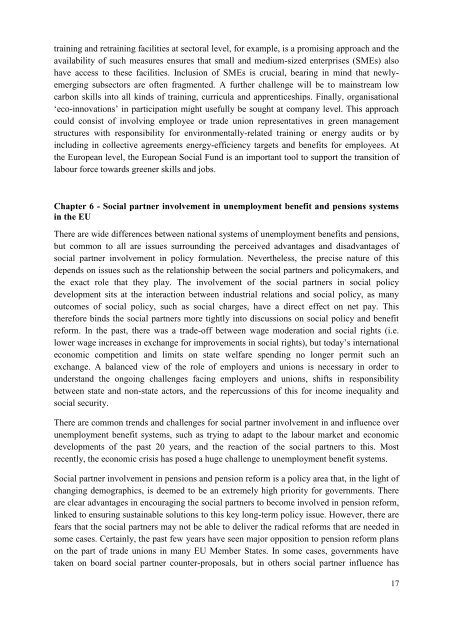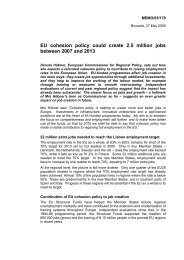Industrial Relations in Europe 2012 - European Commission - Europa
Industrial Relations in Europe 2012 - European Commission - Europa
Industrial Relations in Europe 2012 - European Commission - Europa
You also want an ePaper? Increase the reach of your titles
YUMPU automatically turns print PDFs into web optimized ePapers that Google loves.
tra<strong>in</strong><strong>in</strong>g and retra<strong>in</strong><strong>in</strong>g facilities at sectoral level, for example, is a promis<strong>in</strong>g approach and the<br />
availability of such measures ensures that small and medium-sized enterprises (SMEs) also<br />
have access to these facilities. Inclusion of SMEs is crucial, bear<strong>in</strong>g <strong>in</strong> m<strong>in</strong>d that newlyemerg<strong>in</strong>g<br />
subsectors are often fragmented. A further challenge will be to ma<strong>in</strong>stream low<br />
carbon skills <strong>in</strong>to all k<strong>in</strong>ds of tra<strong>in</strong><strong>in</strong>g, curricula and apprenticeships. F<strong>in</strong>ally, organisational<br />
‘eco-<strong>in</strong>novations’ <strong>in</strong> participation might usefully be sought at company level. This approach<br />
could consist of <strong>in</strong>volv<strong>in</strong>g employee or trade union representatives <strong>in</strong> green management<br />
structures with responsibility for environmentally-related tra<strong>in</strong><strong>in</strong>g or energy audits or by<br />
<strong>in</strong>clud<strong>in</strong>g <strong>in</strong> collective agreements energy-efficiency targets and benefits for employees. At<br />
the <strong>Europe</strong>an level, the <strong>Europe</strong>an Social Fund is an important tool to support the transition of<br />
labour force towards greener skills and jobs.<br />
Chapter 6 - Social partner <strong>in</strong>volvement <strong>in</strong> unemployment benefit and pensions systems<br />
<strong>in</strong> the EU<br />
There are wide differences between national systems of unemployment benefits and pensions,<br />
but common to all are issues surround<strong>in</strong>g the perceived advantages and disadvantages of<br />
social partner <strong>in</strong>volvement <strong>in</strong> policy formulation. Nevertheless, the precise nature of this<br />
depends on issues such as the relationship between the social partners and policymakers, and<br />
the exact role that they play. The <strong>in</strong>volvement of the social partners <strong>in</strong> social policy<br />
development sits at the <strong>in</strong>teraction between <strong>in</strong>dustrial relations and social policy, as many<br />
outcomes of social policy, such as social charges, have a direct effect on net pay. This<br />
therefore b<strong>in</strong>ds the social partners more tightly <strong>in</strong>to discussions on social policy and benefit<br />
reform. In the past, there was a trade-off between wage moderation and social rights (i.e.<br />
lower wage <strong>in</strong>creases <strong>in</strong> exchange for improvements <strong>in</strong> social rights), but today’s <strong>in</strong>ternational<br />
economic competition and limits on state welfare spend<strong>in</strong>g no longer permit such an<br />
exchange. A balanced view of the role of employers and unions is necessary <strong>in</strong> order to<br />
understand the ongo<strong>in</strong>g challenges fac<strong>in</strong>g employers and unions, shifts <strong>in</strong> responsibility<br />
between state and non-state actors, and the repercussions of this for <strong>in</strong>come <strong>in</strong>equality and<br />
social security.<br />
There are common trends and challenges for social partner <strong>in</strong>volvement <strong>in</strong> and <strong>in</strong>fluence over<br />
unemployment benefit systems, such as try<strong>in</strong>g to adapt to the labour market and economic<br />
developments of the past 20 years, and the reaction of the social partners to this. Most<br />
recently, the economic crisis has posed a huge challenge to unemployment benefit systems.<br />
Social partner <strong>in</strong>volvement <strong>in</strong> pensions and pension reform is a policy area that, <strong>in</strong> the light of<br />
chang<strong>in</strong>g demographics, is deemed to be an extremely high priority for governments. There<br />
are clear advantages <strong>in</strong> encourag<strong>in</strong>g the social partners to become <strong>in</strong>volved <strong>in</strong> pension reform,<br />
l<strong>in</strong>ked to ensur<strong>in</strong>g susta<strong>in</strong>able solutions to this key long-term policy issue. However, there are<br />
fears that the social partners may not be able to deliver the radical reforms that are needed <strong>in</strong><br />
some cases. Certa<strong>in</strong>ly, the past few years have seen major opposition to pension reform plans<br />
on the part of trade unions <strong>in</strong> many EU Member States. In some cases, governments have<br />
taken on board social partner counter-proposals, but <strong>in</strong> others social partner <strong>in</strong>fluence has<br />
17

















